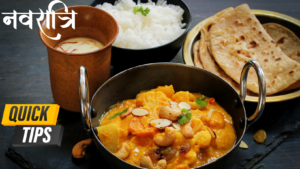Navratri Fasting Rules and Tips
Navratri Fasting Rules: Navratri is a nine-day Hindu festival that celebrates the victory of good over evil. It is a time of devotion and spiritual cleansing, and many people choose to fast during this period. Navratri fasting has many benefits, both physical and spiritual. It can help to detoxify the body, improve digestion, and boost energy levels. It can also help to focus the mind and increase spiritual awareness.
Navratri Fasting Rules
The rules for Navratri fasting vary depending on the region and tradition. However, there are some general rules that are followed by most people. These rules include:
- Avoiding meat, fish, and eggs
- Avoiding animal products such as milk, yogurt, and cheese
- Avoiding certain vegetables such as onions, garlic, and mushrooms
- Avoiding alcohol and tobacco
- Eating only sattvic food (food that is pure and light)
During Navratri, it is important to stay hydrated and avoid overeating. It is also important to listen to your body and break your fast if you feel unwell.
Navratri Fasting Rules & Tips
Here are some tips for fasting during Navratri:
- Plan your meals ahead of time. This will help you to avoid making unhealthy choices when you are hungry.
- Eat small, frequent meals. This will help to keep your blood sugar levels stable and prevent hunger pangs.
- Drink plenty of fluids. Water is the best choice, but you can also drink herbal teas and fruit juices.
- Avoid caffeine and alcohol. These substances can dehydrate you and make you feel more tired.
- Get enough rest. Fasting can take a toll on your energy levels, so it is important to get plenty of sleep.
Navratri Fasting Recipes
There are many delicious and nutritious recipes that you can enjoy during Navratri. Here are a few ideas:
- Khichdi: Khichdi is a simple but delicious dish made with rice, lentils, and spices. It is a good source of carbohydrates and protein.
- Sabudana khichdi: Sabudana khichdi is a variation of khichdi that is made with tapioca pearls instead of rice. It is a popular dish during Navratri because it is easy to digest and does not contain any animal products.
- Kuttu ka atta paratha: Kuttu ka atta paratha is a flatbread made with buckwheat flour. It is a good source of fiber and protein.
- Singhara ka atta poori: Singhara ka atta poori is a puffed bread made with water chestnut flour. It is a popular Navratri snack that is often served with aloo ki sabzi (potato curry).
- Fruit chaat: Fruit chaat is a refreshing and healthy snack that is perfect for Navratri. It is made with a variety of fruits and nuts, and it is often topped with yogurt and honey.
Benefits of Navratri Fasting
Navratri fasting has many benefits, both physical and spiritual. Some of the physical benefits of Navratri fasting include:
- Detoxification: Fasting helps to remove toxins from the body.
- Weight loss: Fasting can help to promote weight loss.
- Improved digestion: Fasting can help to improve digestion and absorption of nutrients.
- Boosted energy levels: Fasting can help to boost energy levels.
- Reduced risk of disease: Fasting has been shown to reduce the risk of chronic diseases such as heart disease, stroke, and diabetes.
Some of the spiritual benefits of Navratri fasting include:
- Increased focus and concentration: Fasting can help to focus the mind and improve concentration.
- Increased spiritual awareness: Fasting can help to increase spiritual awareness and connect with the divine.
- Reduced stress and anxiety: Fasting can help to reduce stress and anxiety.
- Increased sense of well-being: Fasting can help to increase overall sense of well-being.
Conclusion
Navratri fasting is a time of devotion and spiritual cleansing. It has many benefits, both physical and spiritual. If you are considering fasting during Navratri, be sure to talk to your doctor first to make sure that it is safe for you.
Frequently Asked Questions and Answers on Navratri Fasting Rules
Q: What is Navratri fasting Rules?
Navratri fasting rules are Hindu religious practice of abstaining from certain foods and drinks during the nine-day Navratri festival. Navratri is a time of devotion to Goddess Durga, and fasting is seen as a way to purify the body and mind and to seek her blessings.
Q: What foods and drinks are avoided as per Navratri fasting rules?
A: The specific foods and drinks that are avoided during Navratri fasting rules vary depending on the region and tradition. However, some common restrictions include:
- Meat, fish, and eggs
- Animal products such as milk, yogurt, and cheese
- Certain vegetables such as onions, garlic, and mushrooms
- Alcohol and tobacco
- Foods that are high in oil and spices
Q: Why are these foods and drinks avoided during Navratri fasting?
A: There are a few reasons why these foods and drinks are avoided during Navratri fasting. One reason is that they are considered to be tamasic, or impure. Tamasic foods are believed to increase the body’s rajas (passion) and tamas (inertia) gunas, which can lead to negative thoughts and emotions.
Another reason for avoiding these foods and drinks is that they can be difficult to digest. Fasting is a time to give the digestive system a rest, so it is important to avoid foods that can be difficult to break down.
Finally, some of these foods and drinks are avoided because they are associated with violence and death. For example, meat and fish are associated with the killing of animals, and alcohol is associated with intoxication. During Navratri, devotees strive to create a peaceful and harmonious environment, so they avoid foods and drinks that are associated with violence and negativity.
Q: What foods can I eat during Navratri fasting as per Navratri fasting rules?
A: There are many delicious and nutritious foods that you can eat during Navratri fasting. Some popular options include:
- Fruits and vegetables such as apples, bananas, oranges, cucumbers, tomatoes, and potatoes
- Whole grains such as rice, quinoa, and buckwheat
- Legumes such as lentils and beans
- Nuts and seeds
- Dairy-free milk alternatives such as almond milk, soy milk, and coconut milk
Q: What are some tips to follow for Navratri fasting rules ?
A: Here are some tips to follow for Navratri fasting rules :
- Plan your meals ahead of time. This will help you to avoid making unhealthy choices when you are hungry.
- Eat small, frequent meals. This will help to keep your blood sugar levels stable and prevent hunger pangs.
- Drink plenty of fluids. Water is the best choice, but you can also drink herbal teas and fruit juices.
- Avoid caffeine and alcohol. These substances can dehydrate you and make you feel more tired.
- Get enough rest. Fasting can take a toll on your energy levels, so it is important to get plenty of sleep.
Q: What are the benefits of Navratri fasting?
A: Navratri fasting has many benefits, both physical and spiritual. Some of the physical benefits of Navratri fasting include:
- Detoxification: Fasting helps to remove toxins from the body.
- Weight loss: Fasting can help to promote weight loss.
- Improved digestion: Fasting can help to improve digestion and absorption of nutrients.
- Boosted energy levels: Fasting can help to boost energy levels.
- Reduced risk of disease: Fasting has been shown to reduce the risk of chronic diseases such as heart disease, stroke, and diabetes.
Some of the spiritual benefits of Navratri fasting include:
- Increased focus and concentration: Fasting can help to focus the mind and improve concentration.
- Increased spiritual awareness: Fasting can help to increase spiritual awareness and connect with the divine.
- Reduced stress and anxiety: Fasting can help to reduce stress and anxiety.
- Increased sense of well-being: Fasting can help to increase overall sense of well-being.
Navratri Fasting Rules and Tips
Navratri Fasting Rules and Tips Navratri Fasting Rules: Navratri is a nine-day Hindu festival that celebrates the victory of good over evil. It is a time of devotion and spiritual...
Read MoreNavratri Fast: Everything You Need to Know
Navratri Fast: Food Guide Navratri is a nine-day Hindu festival that celebrates the victory of good over evil. It is a time of spiritual devotion and purification, and many people...
Read MoreEnergize Your Navratri Fast with These Must-Try Food Choices
What to Eat in Navratri Fast? During Navratri fasting, there are certain food restrictions and guidelines that devotees follow. Here are some general rules on what to eat and what...
Read More




4 thoughts on “Navratri Fasting Rules and Tips”